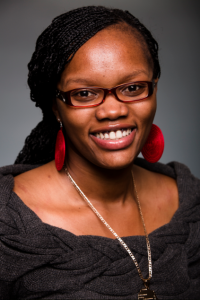Twenty-four-year-old Claudine Kuradusenge is one of 50,000 refugees who call Utah home. Her story, however, revolves not around numbers but around her own family’s traumatic experiences and her journey to become a Utah Valley University graduate — a journey with more twists than most graduates will experience in their lifetimes.
Kuradusenge, who will be honored with other Utah refugees Saturday, June 22, at Liberty Park in Salt Lake City as part of World Refugee Day, was born in Rwanda at the height of the Rwandan genocide. She bounced between her parents’ home and living with her aunt and uncle as a toddler, losing her father and then her uncle just before the worst of the violence set in.
When the genocide began in full force, Kuradusenge was sent back to live with her mother. They immediately fled to a refugee camp in the Congo, although it would prove impossible for them to avoid the carnage along the way.

“It was traumatizing; I remember we could see dead bodies all around, and there was blood all over,” Kuradusenge said. “Seeing that just made me so I couldn’t stop crying. And (the) worst thing was the smell, you could smell the blood.”
During the chaotic move, Kuradusenge’s three-year-old sister became ill. Because of the scarcity of food, water and medical supplies in the United Nations camp, her younger sister did not survive.
“I was not crying … I guess I was just shocked,” Kuradusenge said. “When my baby sister died I just stopped talking. It took me two years to talk again.”
Kuradusenge’s mother was able to contact a close relative in Europe and send her daughter there, away from the camp. But Kuradusenge’s tremendous losses were not finished: her mother was unable to join her and passed away three years later.
“The day I left that refugee camp was the last day I saw my mom,” Kuradusenge said.
She spent 12 years in Europe as a non-citizen refugee, enjoying only limited opportunities because of her legal status. She was required every year to go back to the embassy and prove that she was not doing anything illegal, that she was trying to attend school and that she was being a good citizen.
Still, the violence and tragedy Karadusenge had witnessed instilled in her a desire to obtain an education, a dream she achieved while studying in Utah. After moving to the United States at age 21, she studied public relations with a minor in human and criminal justice at UVU and will soon move to Virginia, where she will attend George Mason University and study conflict resolution.
Kuradusenge says it is even hard now, 19 years later, for her family to talk about what has gone on. She says she received strength to speak about her experiences because of her personal growth at UVU.
According to the UN Refugee Agency, “World Refugee Day was established by the United Nations to honor the courage, strength and determination of women, men and children who are forced to flee their homes under threat of persecution, conflict and violence.”
Although the actual date for World Refugee Day is Thursday, June 20, Utah will be celebrating it Saturday, June 22. The event is open to the public, and admission is free. Events will include a 5K and culture-themed entertainment and food.
“People from the welcoming community will be able to meet some refugees and start to get to know them,” said Gerald Brown, director of the Utah Refugee Services Office. “The integration, which is what we all want, is dependent upon people getting to know each other. That is really the focus on the whole day.”




